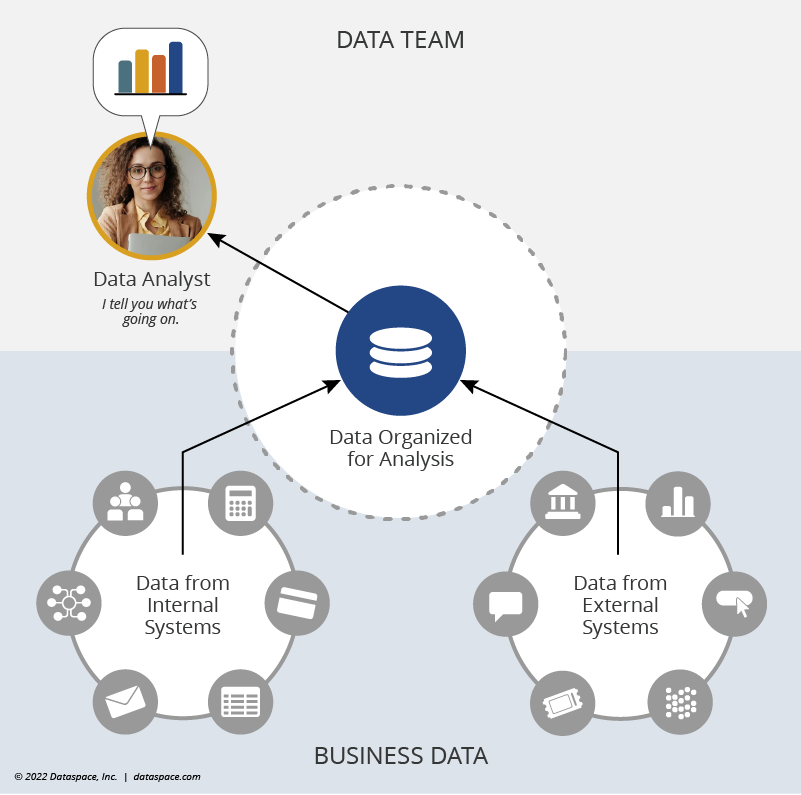In our post laying out the major analytics roles, data scientist, data engineer, and data analyst, we said that…
In the broadest sense, a data analyst takes the data collected by a business and uses it to describe what’s going on.
These days, taking care of business means dealing with lots and lots of data. Using that data should be more than storage and retrieval. You need to understand what your business data means for your growth and success. And to do this best, you need expert analysis—you need a data analyst on your team.
Data analysts help you connect the dots between your business goals and your business reality. You know where you want to be. Understanding your business data will show you where you actually are. And, it will help you make the decisions needed to get your business to the next level.
It’s easy to see why data analysts are often the first hire for a data team, as well as the most in-demand role of all the data sciences.

What data analysts do to understand your data
Now that we’ve reviewed why businesses need a data analyst, let’s look at what exactly they do to help you make sense of your data.
To make decisions, managers need to know how successful their business efforts are.
So they ask questions: Did the social media campaign work? Are the new app features a success? Is the shipping department working efficiently?
Data analysts use your company’s data to find answers to those questions. To do so, they will:
- Define the purpose behind the questions.
- Identify what data is needed and where to get it.
- Collect and combine the data so it can be analyzed.
- Analyze the data and interpret what it means.
- Present the data in a way that others, including nontechnical managers, can understand it.
This is the heart of what data analysts do day to day. And to get the job done, they’ll need business acumen as well as skills in databases, coding, analytic thinking, and visual communication. And most of all, the ability to bring it all together.
A data analyst by any other name: data analyst job titles
There’s a lot of variety in job titles that fall under the umbrella of data analyst, as well as a lot of variation in responsibilities. While all data analysts work to understand business data, they can also focus on a particular industry, aspect of business, or part of the analysis process we described above.
Below are some of the more common data analyst job titles as well as what sets them apart.
Analyst
This generalized title can mean a lot of things depending on the business. But it often indicates a role that is less technical and more focused on interpreting data. However it can also be used outside the realm of data analytics.
Analytics Developer
This analytics role does the technical legwork to transfer data from various databases into analytics tools. They often serve as a conduit between engineering and other analysts. While coding is involved, their job is preparing data specifically for analysis.
Business Analyst
A business analyst works closely with business managers. They need to have an in-depth understanding of corporate goals. They use that knowledge to interpret data in ways that help managers make decisions.
Business Intelligence Analyst
At first glance, a business intelligence analyst and a business analyst seem analogous. And, in practice it often is—especially on small data teams. A common distinction is that a BI analyst focuses on collecting and interpreting the data. Whereas a business analyst works to apply interpretations to business planning.
Business Intelligence Developer
This type of analyst is focused on developing dashboards and analyses, typically in a BI tool like Tableau or Power BI.
Data Analyst
This is the most common job title we see for anything analytics related. And those roles often encompass a wide range of analytic skills. Mature data teams tend to be more specific with job titles for analysts. As such, Data Analyst can indicate more of a catch-all position.
Data Quality Analyst
The primary concern of this role is ensuring the data used for business decisions is accurate and reliable. The work is more technical and takes place early in the data analysis process.
Data Visualization Specialist
These analysts are focused on how data is presented to business managers. But more specifically, they design charts and graphs that make it easy to understand.
And, this list only scratches the surface of data analyst job titles. More specialized analytics include titles such as (and so many more!):
- Financial Analyst
- Healthcare Analyst
- Logistics Analyst
- Marketing Analyst
- Operations Analyst
- Product Analyst
- Research Analyst
- Systems Analyst
Hiring the right data analyst to understand your business
Whether you are looking to add another data analyst to your team or hiring your first one, here are some things you’ll want to consider.
Demand for Data Analysts
First, know that data analysts of all types are in very high demand. This means finding the right analyst for your business may take some time. If you factor in technology or industry specializations, it can be even more challenging. Consider, too, that professional recruiters are proactively wooing the best data analysts. Simply posting your opening to a few job boards is no longer enough.
Data Analyst Pay
In 2021, the average salary for data analysts in the U.S. was about $70,000 per year. At Dataspace, we regularly see salaries of $80,000 – 100,000, and above. While most of the jobs we work on are mid- to senior-level roles, the competitiveness of the field means data analysts of all levels command higher pay.
Role of a Data Analyst
Depending on your business size, goals, and the data you collect, you may benefit from multiple analyst roles. Many companies start with a generalized data analyst and grow from there. Even a small data team should include at least one analyst. They will focus on understanding business data in the present. This allows other data team members—data engineers and data scientists—to focus on what they do best. (More on those roles to come.)
Common Data Analyst Skills
The specific skills data analysts need to understand your business will depend on your industry, goals, and tech stack. If you have multiple analysts focused on different parts of the process, that will factor in too. For example, an Analytics Developer does not need to know as much about presenting data as a Data Visualization Specialist. Keep this in mind when writing a job description for a data analyst. A big red flag for applicants is a laundry list of requirements that aren’t truly necessary for the role.
As a starting point, the two skills we most commonly see required for data analysts are strong SQL and expertise in one or more business intelligence tools, like Power BI, Tableau, or Looker.
Data Analyst Experience
Another thing to consider is how much experience you actually need. Any role in the realm of data is constantly evolving, and data analysts are no exception. This is unavoidable since technology advances so rapidly. A competent data analyst will be wired for learning and growth. It’s often more important to have problem-solving skills than years of experience with a particular technology. Above all, data analysts need to deeply understand how to make sense of business data. The tools to do so can be very similar and even interchangeable. Assuming baseline skills in the tools you need, hire for fit, analytical thinking, and adaptability.
Every business can benefit from a data analyst
If we had to pick the one data science role you can’t live without, it would be a data analyst. When you add a data analyst to your team, you\’re laying the groundwork for lasting growth. We help many startups and small businesses on the precipice of breakout success find the right data analysts to help them get there. And we help well-established enterprises keep their data analytics teams strong. It\’s hard to go wrong when you invest in understanding your business data.
Do you need help defining and filling your first data analyst role?
Are you looking to add power to your analytics team? Contact our experienced data analyst recruiters to get the ball rolling.

